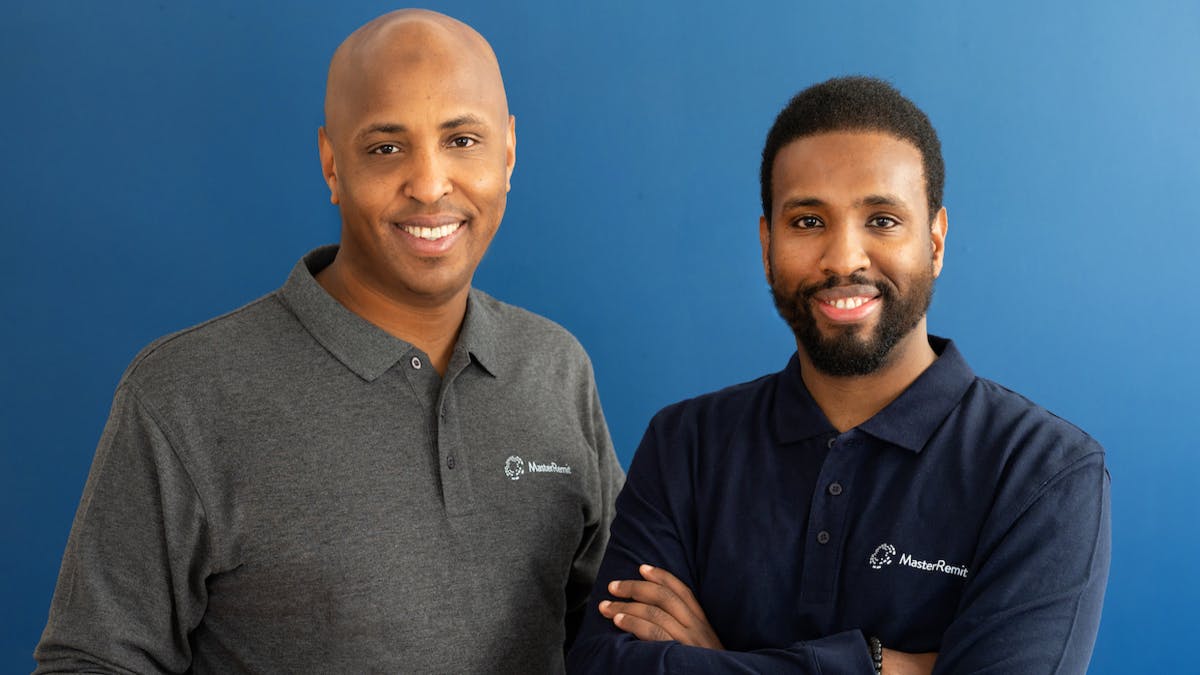Australia is the fourth most expensive G20 country in the world to send remittances from due to exorbitant merchant fees and an antiquated financial system.
For every $1,000 money transfer, Australians pay $23 more than Americans, $9 more than the British and $4 more than Canadians.
Despite this, more than 7.6 million migrants live in Australia and have family and loved ones overseas in need of financial assistance. Many of those with family living abroad are based in developing nations, and some of them are ‘unbanked’, without access to digital technology or a financial institution.
Somali migrants Nuradin and Hashim Omar saw their families impacted by this problem firsthand after they could not send money to a loved one in need of urgent help due to limited providers and a lack of financial inclusion.
The brothers and co-founders are now on a mission with their startup MasterRemit to achieve financial equality for people worldwide and make sending remittances more affordable and accessible for those without access to technology or a financial institution.
Breaking down financial barriers for international transfers
The pandemic has further exacerbated issues relating to financial equality and remittance due to job losses, illness, financial strife and economic uncertainty faced by families around the globe.
However, as money becomes increasingly digitised due to COVID-19 and technological advancements, consideration for disproportionately impacted people has never been more critical.
Nuradin Omar, CEO of MasterRemit, says the ‘traditional international remittance model’ must be turned on its head to create a level financial playing field when it comes to sending money.
“Technology has the power to radically change the way we send remittance to balance the scales of financial equality. However, two billion people worldwide still don’t have access to a bank account or financial institution to receive money. These customers fall through the cracks when it comes to traditional transfer providers, yet are often the most in need,” explains Nuradin.
Providing financial assistance to these ‘unbanked’ customers without access to digital technology or a financial institution is vital for the founders who built this ethos into their startup model.
“We connect unbanked people to the wider world in a unified financial ecosystem by allowing customers to receive payments instantly to a mobile phone or via collection at a nominated pickup point. No one should have to go without simply due to a lack of access to services,” said Nuradin.
And while sending remittances internationally has always been expensive, Nuradin Omar questioned why this is still the case with the advancement of technology, this is still the case.
“The model surrounding money transfers plays a big role in its expense for users. Traditional methods involve a person from a first-world country providing cash or digital remittance to an agent, which is transferred to a developing nation and to another agent.
“Your loved one then has to collect it from the agent via a bank, shop or bureau de change, usually in cash. The money is sent through many hands, and the customer is the one left paying for that,” explains Nuradin.
Global remittance leaders like Western Union, MoneyGram and hundreds of smaller rivals rely on a model similar to this, despite countless issues with it.
“This method relies on several touchpoints and merchants whose fees are built into the cost for the customer. It also only caters to customers who have access to a financial institution and/or technology, which poses significant difficulties for unbanked people in developing nations,” said Nuradin.
As the economic repercussions of the pandemic continue to be felt worldwide, global remittances to low and middle-income countries have continued to decline. Thus, finding solutions that create a cost-effective and equal remittance flow worldwide is vital.
Reducing the cost of sending remittance
Australia is the 11th largest remittance sending country in the world, in a global market worth $20.1 billion, yet extortionate hidden fees and FX margins have resulted in customer mistrust. And with transaction fees averaging around 9.94 per cent, many avoid sending remittance internationally altogether for fear of high transaction costs.
“Innovation surrounding technology is beginning to transform the financial remittance landscape, but it’s taking time. Ultimately users need an ecosystem that makes it easy for them to send money in a trustworthy yet fast, secure and low-cost manner,” said Nurdain.
“That’s why we built our ecosystem, to provide customers with a means to send money at a low cost at any time, anywhere. We’re able to keep our business costs down enough to offer substantially lower transaction fees than the industry leaders, which has made a huge difference to our customers,” said Nuradin.
MasterRemit offers no hidden fees, low costs and excellent exchange rates, 24/7 online service and real-time transaction processing to ensure funds reach those in need immediately. Taking pride in its transparent operation, the startup hopes to break the traditional high-cost model of international money transfers and connect those in developing nations.
Hitting a milestone of over 130,000 transactions processed since its inception and more than 2,800 active customers, Nuradin and Hashim Omar are on a mission to continue reinventing the financial services sector to create greater equality and transparency for all.
Keep up to date with our stories on LinkedIn, Twitter, Facebook and Instagram.

